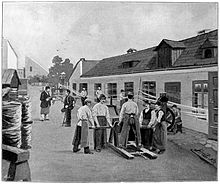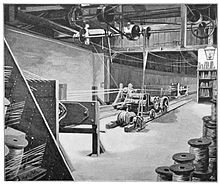Joh. B. Petzl & Son
The company Joh. B. Petzl & Sohn was a rope maker in Vienna who specialized in the manufacture of hemp and wire ropes , belts , hammocks , gymnastics equipment , etc.
history
On August 26, 1825, Johann Petzl (born August 31, 1788 in Auerschitz ; † 1833) was authorized to operate the rope trade in Vienna. It began in the former "Franz-Allee", later Kaiser-Josef-Straße, with a small, simple rope spinning mill. In 1828 he opened a wear-and-tear shop in what was then the casemates at Rotenturm Gate with very little capital, which his wife Josefa managed successfully, while he was the owner of the workshop like any other worker.
After his death, his widow married the master rope maker Janusch and continued the business successfully. In 1834 she was able to acquire the little house at Dietrichgasse 6 in the 3rd district of Landstrasse and later withdraw from the business entirely.
Josefa Petzl had a son from her first marriage, Johann Baptist Petzl. In 1848 he acquired the citizenship of the city of Vienna. During the revolution of 1848/49 in the Austrian Empire from October 11th to 30th, 1848, the Imperial and Royal Mint was threatened with looting by the mob. As a citizen grenadier of the IV. Company, Petzl took care of the guard duty and fended off attempts at arson and burglary with bravery and self-sacrifice. The decree of the management of the Imperial and Royal Mint on December 26, 1848, paid tribute to this achievement. Two years later in 1850 he took over the family business. It became a major company under his leadership.
As a result of the demolition of the Vienna city walls and casemates, the sales room was moved to Adlergasse 12 in 1856, and from here in 1875 to Franz-Josefs-Kai 5, where the wear and tear area was located. In addition to the commercial success, Johann B. Petzl also enjoyed recognition from his own specialist colleagues. When he was sent to the London World Exhibition in 1862 , he was recognized in writing by the Commune of Vienna for his services.
Among the inventions he made and improvements introduced were the winding machines and the machine for making tarred ropes. Johann B. Petzl founded the production of the popular hammocks. Special achievements were also made in the improvement of sheep's wool belts , elevator belts for mills , machine belts, horse netting and knotting. These achievements also caught the attention of the imperial court. On August 23, 1864, the civil master rope master Johann Baptist Petzl was awarded the title of kuk court rope master by the chief court master 's office. At the world exhibition in 1873 he was the first to be awarded the medal of progressiveness.
In 1881 the machine production of wire and hemp ropes was introduced. In this year the company was entrusted by the kuk Kriegsmarine with covering the needs of all kinds of cake. In 1884, Petzl was the awarding of the for his contributions to the industry with the All-Highest Resolution of 10 January 1884 Merit Award. His work met with full recognition from many quarters, in particular the kk authorities, the municipality of Vienna and the commission of the jubilee trade fair in 1888 . Johann B. Petzl was also active in public life: he was on the committee of the III. Viennese district Landstrasse active.
After his death in 1888, his widow Anna Katharina geb. Cichocki the operation. In 1892 she introduced the mechanical spinning mill for ropes. Machines from the Sam company . Lawson & Sons from Leeds in England were used for the manufacture. These spinning machines had the advantage that they could spin Italian as well as Hungarian and Manila hemp in its entire length, so there was no need to cut and tear. This increased the durability of the ropes significantly compared to ropes made from short hemp. The company also carried out the mechanical production of linen , cord and twine thread . For the production of these sheaf binding threads, Petzl received a recognition diploma at the competitive exhibition for mowing machines organized by the Hungarian National Association for Agriculture in Nyíregyháza in 1893 , in which these brands were named the best of the ten competitors.
The widow Anna Petzl continued the company together with her sons Johann and Robert at the end of the 19th century.
Individual evidence
- ↑ Franz Baur's sons . In: The large-scale industry of Austria. Festive offer for the glorious fifty-year jubilee of His Majesty the Emperor Franz Josef I's reign, presented by the Austrian industrialists in 1898 . tape 4 . Vienna 1898, p. 326-328 .






